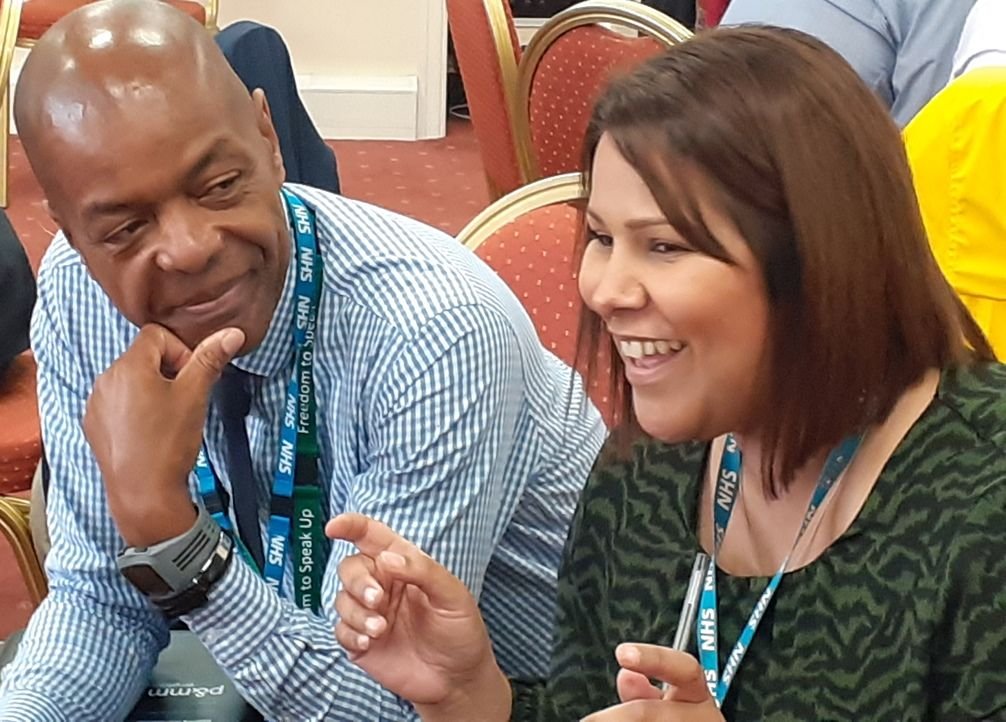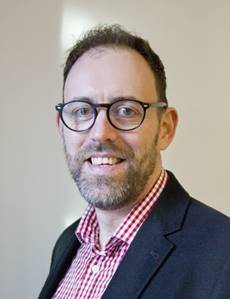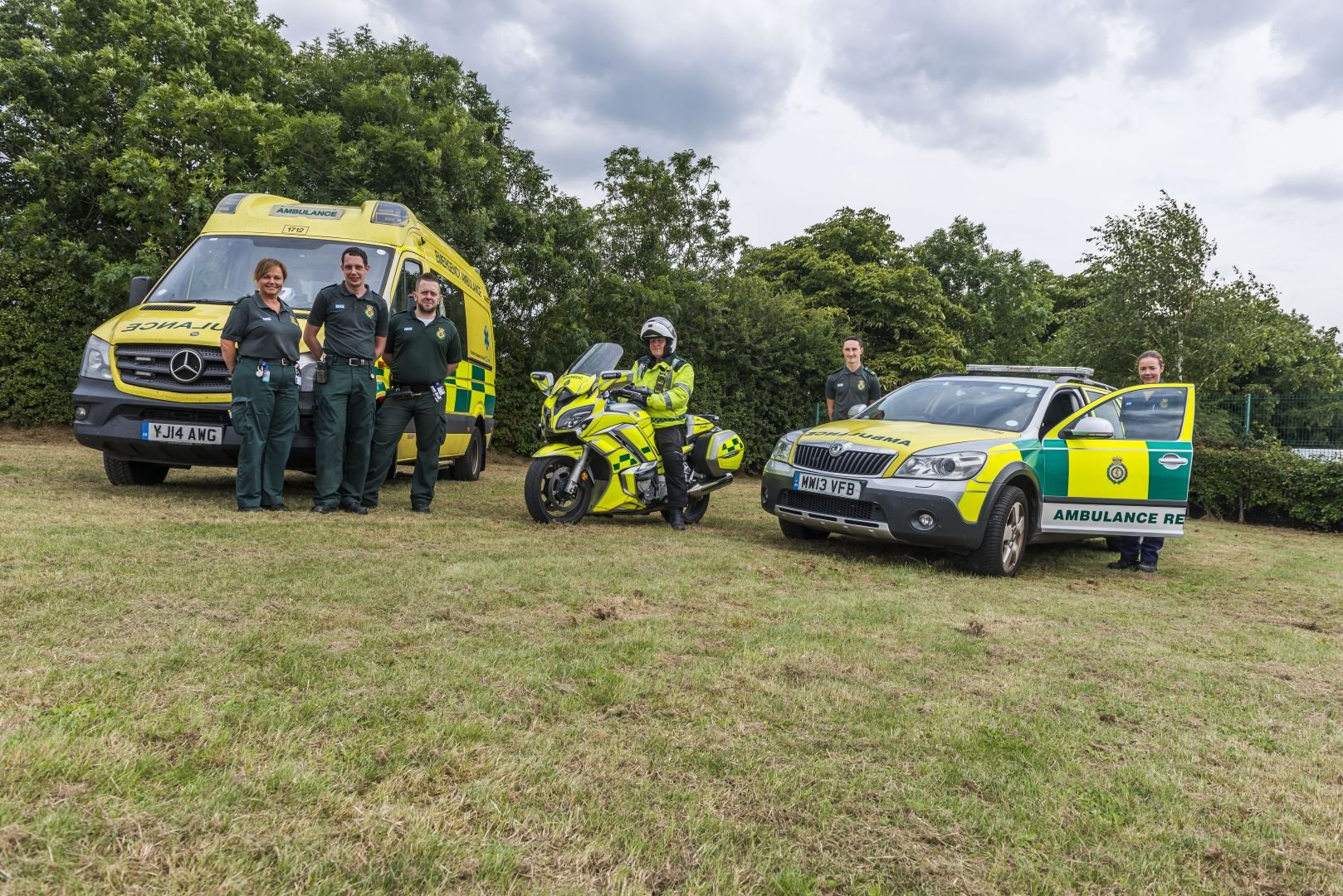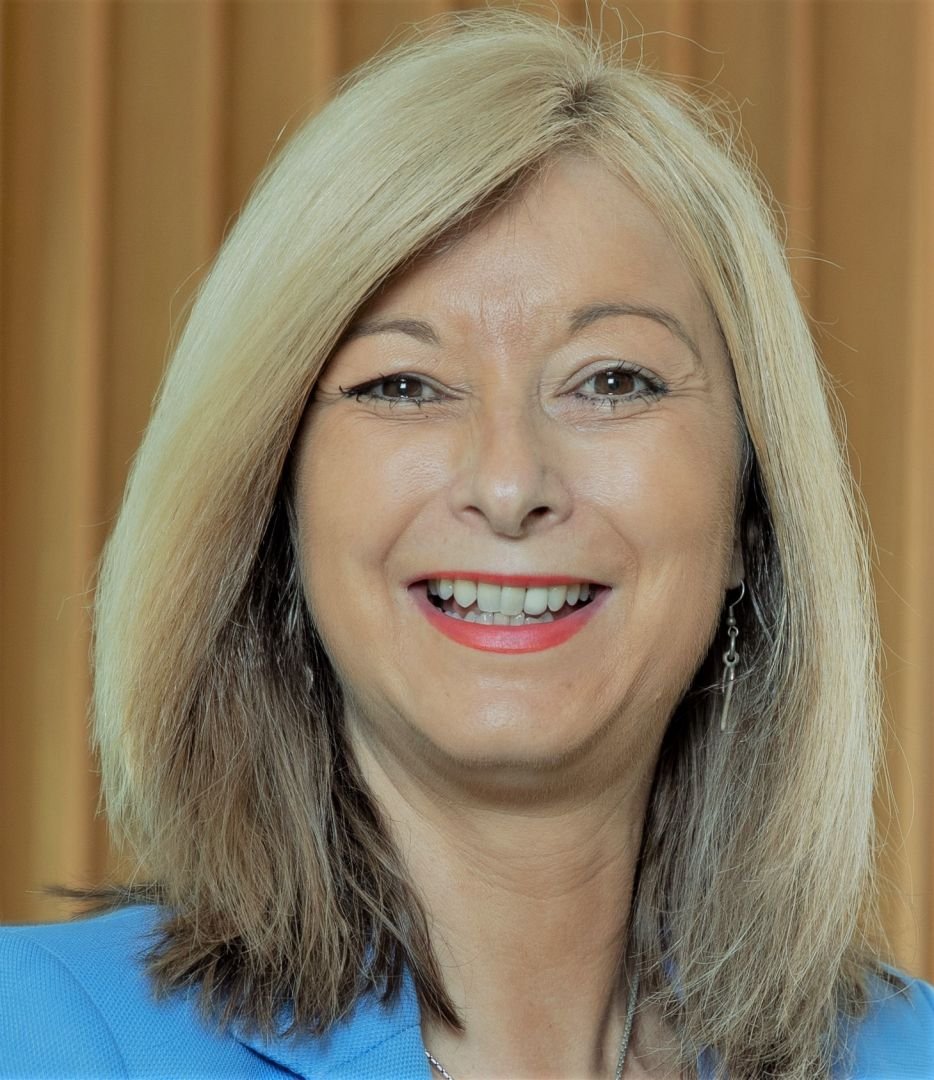What else has been happening this week?
Leeds Teaching Hospitals NHS Trust granted Outline Planning Permission to build a state-of-the-art Pathology laboratory
 Leeds Teaching Hospitals NHS Trust has been granted Outline Planning Permission from Leeds City Council’s North and East Plans Panel to build a state-of-the-art Pathology laboratory on the St James’s University Hospital site. The new laboratory will serve hospitals across Leeds, West Yorkshire and Harrogate and will allow the Trust to bring many of its Pathology services together into a purpose-built laboratory that incorporates advanced equipment and technology for fast, accurate specialist testing.
Leeds Teaching Hospitals NHS Trust has been granted Outline Planning Permission from Leeds City Council’s North and East Plans Panel to build a state-of-the-art Pathology laboratory on the St James’s University Hospital site. The new laboratory will serve hospitals across Leeds, West Yorkshire and Harrogate and will allow the Trust to bring many of its Pathology services together into a purpose-built laboratory that incorporates advanced equipment and technology for fast, accurate specialist testing.
It will also be part of the West Yorkshire Association of Acute Trusts (WYAAT) Pathology Network and provide significant opportunities to improve staffing and skill sharing as well as equipment efficiencies.
Many of Leeds Teaching Hospital’s Pathology services are currently housed in outdated facilities in the Old Medical School at Leeds General Infirmary (LGI). Most of those services, as well as some of those delivered from St James’s University Hospital, will be incorporated in the new laboratory.
Preparation work for the new Pathology laboratory will begin soon, with design work the next step in the process. Demolition of old buildings on the St James’s site is expected to begin later this year with the new laboratory scheduled to be completed in the spring of 2023.
Partnership’s Black, Asian and minority ethnic communities and staff review
 The Partnership set up an independent review into the impact of COVID-19 on health inequalities and support needed for Black Asian and minority ethnic (BAME) communities and staff in July 2020. The review sessions are chaired by Professor Dame Donna Kinnair, Chief Executive and General Secretary of the Royal College of Nursing, a leading figure in national health and care policy.
The Partnership set up an independent review into the impact of COVID-19 on health inequalities and support needed for Black Asian and minority ethnic (BAME) communities and staff in July 2020. The review sessions are chaired by Professor Dame Donna Kinnair, Chief Executive and General Secretary of the Royal College of Nursing, a leading figure in national health and care policy.
The third of fourth sessions took place on Monday. The group, which includes colleagues from across the Partnership, voluntary and community organisation representatives and members of the BAME network, discussed two of deep dive themes, workforce and leadership. This included understanding the impact of COVID-19 on colleagues and reducing inequalities for BAME communities. The other theme was around ensuring leadership is reflective of our communities and making sure VCS colleagues have a voice. Leadership includes BAME colleagues being representative on key decision making forums. Training, identifying and sharing good work practice, recognising BAME talent, cultural literacy and disciplinary and 'learning' processes were all discussed.
There was an update from the voluntary and community sub-group which emphasised the need for parity of esteem and the need for Partnership support to influence central funding for local support.
It was helpful to hear from Kez Hayat, Head of Equality, Diversity and Inclusion at Bradford Teaching Hospitals, who gave a powerful and inspiring personal and professional testimony of his work during COVID-19 and as part of the BAME Network.
You can read the papers from the meeting here. The next meeting will take place on Wednesday 2 September 2020, 9am – 11am via Microsoft Teams.
Improving population health programme
 The Improving Population Health Programme Board met last week, chaired by Dr James Thomas. The Board considered the requirements of the NHS England coronavirus phase 3 letter and received a presentation from Programme Director Sarah Smith outlining the Programme’s approach and response.
The Improving Population Health Programme Board met last week, chaired by Dr James Thomas. The Board considered the requirements of the NHS England coronavirus phase 3 letter and received a presentation from Programme Director Sarah Smith outlining the Programme’s approach and response.
The Programme sees an opportunity to accelerate existing work as a system to achieve partnership ambitions and meet the NHS England ask of the Partnership on specific requirements related to health inequalities. Alignment with programme and place plans remains key to success – how we can embed approaches to reduce health inequalities across West Yorkshire and Harrogate.
A number of actions have been identified:
- Action 1: Protect the most vulnerable from COVID-19
- Action 2: Restore NHS Services Inclusively
- Action 3: Inclusion in digitally enabled care pathways
- Action 4: Progress and future programme support
- Action 5: Mental health
- Action 6: Strengthen leadership and accountability – inequalities
- Action 7: Progress and future programme support – BAME
- Action 8: Collaborate locally in planning and delivering action
A timeline for the deliverables set out in the letter around health inequalities has been produced and more information will be communicated as the action plan comes to life.
Integrated Urgent and Emergency Care Programme Board Update (UEC)
 The Urgent and Emergency Care Board met on Tuesday, chaired by Rod Barnes Chief Executive of the Yorkshire Ambulance Service. The board agreed a set of principles to underpin any work around NHS111 First, which is a national initiative aimed at helping people to navigate to the right service for their health need, whilst also aiming to help reduce footfall within Emergency Departments (EDs). The board also received feedback from a conversation which took place between clinicians across the ICS and the regional clinical lead for urgent and emergency care on 12th August. The conversation brought about much more consensus than disagreement around the NHS111 First approach, whilst also recognising that each place has different alternatives to ED available and their own set of challenges in being able to redirect if someone attends ED of their own accord. Communication leads have been working together to develop a draft narrative and a number of key messages in relation to the Think NHS 111 First initiative. These are by no means prescriptive but are there to inform local work and to provide some consistency across the Partnership, where helpful locally.
The Urgent and Emergency Care Board met on Tuesday, chaired by Rod Barnes Chief Executive of the Yorkshire Ambulance Service. The board agreed a set of principles to underpin any work around NHS111 First, which is a national initiative aimed at helping people to navigate to the right service for their health need, whilst also aiming to help reduce footfall within Emergency Departments (EDs). The board also received feedback from a conversation which took place between clinicians across the ICS and the regional clinical lead for urgent and emergency care on 12th August. The conversation brought about much more consensus than disagreement around the NHS111 First approach, whilst also recognising that each place has different alternatives to ED available and their own set of challenges in being able to redirect if someone attends ED of their own accord. Communication leads have been working together to develop a draft narrative and a number of key messages in relation to the Think NHS 111 First initiative. These are by no means prescriptive but are there to inform local work and to provide some consistency across the Partnership, where helpful locally.
Steven, Dykes, Medical Director at Yorkshire Ambulance Service and Andrew Nutter, Deputy Chief Executive & Chief Operating Officer of Local Care Direct gave presentations showing how their organisations have adapted and implemented rapid changes as part of their operational response to working differently as a result of the coronavirus pandemic. They shared how rapid digital developments had supported and enabled clinical delivery and that teams were all affected by and stretched but these experience shave now made them become more flexible organisations and are now more equipped to work in different ways. Yorkshire Ambulance Service also acknowledged the 1,000 response volunteers as ‘really inspiring’ at a time when they were needed most.
Cancer Quality of Life Survey – help promote to increase take-up
A new national Cancer Quality of Life (QoL) Survey is to be launched next month (September), recognising that quality of life outcomes are as important to cancer patients as survival.
A communications toolkit is available on NHS Futures to support local organisations in promoting the survey and encouraging as much take-up as possible by eligible patients.
The survey, launched by NHS England/NHS Improvement and Public Health England, will survey people who have been diagnosed with breast, prostate or colorectal cancer. They will be sent a survey through the post 18 months after their diagnosis to assess their life quality. The information collected from the survey will be used to work out how best to support the growing number of people living with and beyond cancer.
For the first time, the survey will routinely measure Quality of Life outcomes in a way that influences health policy, professional practice and patient empowerment. Although patient reported outcome measures (PROMs) that focus on QoL are in use in parts of the NHS, and in clinical trials round the world, the potential for PROMs to improve care and outcomes for people affected by cancer has not yet been realised.
Cancer Alliances have been asked to work with colleagues in NHS Trusts, community services, commissioning and primary care to ensure as many people as possible complete the survey, so that the information collected fully represents the cancer population. An experienced patient survey company (Quality Health) is managing the survey invite and response system. All the survey responses are being held securely by the Cancer Registry at Public Health England and will be linked with data held about patients in the Cancer Registry to provide an overview of whether quality of life differs, for example, depending on age, gender, cancer type or stage at diagnosis.
Eligible patients will receive a direct invitation to complete the Quality of Life survey online. A paper-based survey will also be available. They will be asked to complete two widely-used quality-of-life questionnaires: the generic EQ-5D and the cancer-specific EORTC QLQ-C30. The survey is easy to complete and generally takes between five and 10 minutes. The survey asks about how people are doing. People’s answers can be related to their cancer diagnosis and treatment, other illnesses, or other things happening in their life. Quality Health will also manage a website (currently under development: www.CancerQoL.england.nhs.uk) and free helpline 0800 783 1775 to support patients to complete the survey and respond to any queries or difficulties.
The results will be analysed by Public Health England. It is anticipated that national and regional level reports will start to be made available in 2021. The feasibility and utility of providing individual summary reports to patients and their clinicians during 2020, prior to a decision on implementing these in 2021, is also being considered. People with all other cancer types will be included in the Quality of Life Survey from 2021 onwards.
More information will be made available over the next couple of weeks.
The NHS Nightingale Hospital Yorkshire and the Humber
The NHS Nightingale Hospital Yorkshire and the Humber has provided important extra capacity for patients and staff as the NHS cared for people with COVID-19 whilst also maintaining other frontline services. An extension to the contract has now been agreed, which will mean more essential health checks, including for cancer, can continue to be delivered in Harrogate - with over 1,200 patients having already had a scan at the facility - while also offering back-up capacity as the country continues to deal with the virus.
The National Institute for Health Protection (NIHP)
From Tuesday 18 August, Public Health England (PHE) and NHS Test and Trace, as well as the analytical capability of the Joint Biosecurity Centre (JBC) came under a single leadership team - The National Institute for Health Protection (NIHP). The organisation will be formalised and operating from spring 2021 and will support local directors of public health and local authorities on the frontline of the COVID-19 response.
Leeds Academic Health Partnership
 Dr Liz Mear has been appointed as managing director for Leeds Academic Health Partnership (LAHP), one of the biggest of its kind in the UK. Liz is currently Chief Executive of the Innovation Agency, the Academic Health Science Network for the North West Coast. She is also an External Director of the Northern Health Science Alliance and of Liverpool Local Enterprise Partnership, as well as a Non-Executive Director for Health Education England. From November, as its new managing director, Liz will lead the LAHP into its next phase. Since its inception in late 2015, the LAHP has laid pioneering foundations including the Leeds Health and Care Academy, The Leeds Centre for Personalised Medicine and Health and an unprecedented, cross-sector, regional healthtech partnership. Its emerging new project, Living in Leeds, will explore with Leeds people how best to use their health and care data to improve care through research and planning. The LAHP is also helping drive forward a new, inclusive growth strategy for the City Region through our involvement in the prestigious Massachusetts Institute of Technology Regional Entrepreneurship Acceleration Program.
Dr Liz Mear has been appointed as managing director for Leeds Academic Health Partnership (LAHP), one of the biggest of its kind in the UK. Liz is currently Chief Executive of the Innovation Agency, the Academic Health Science Network for the North West Coast. She is also an External Director of the Northern Health Science Alliance and of Liverpool Local Enterprise Partnership, as well as a Non-Executive Director for Health Education England. From November, as its new managing director, Liz will lead the LAHP into its next phase. Since its inception in late 2015, the LAHP has laid pioneering foundations including the Leeds Health and Care Academy, The Leeds Centre for Personalised Medicine and Health and an unprecedented, cross-sector, regional healthtech partnership. Its emerging new project, Living in Leeds, will explore with Leeds people how best to use their health and care data to improve care through research and planning. The LAHP is also helping drive forward a new, inclusive growth strategy for the City Region through our involvement in the prestigious Massachusetts Institute of Technology Regional Entrepreneurship Acceleration Program.
Tom Riordan named as interim chair of Leeds Academic Health Partnership Board
 Leeds City Council Chief Executive Tom Riordan has been named as the interim chair of Leeds Academic Health Partnership’s (LAHP) board. Tom’s appointment follows unanimous endorsement by the Partnership’s board members and comes as previous chair Sir Alan Langlands steps down this month.
Leeds City Council Chief Executive Tom Riordan has been named as the interim chair of Leeds Academic Health Partnership’s (LAHP) board. Tom’s appointment follows unanimous endorsement by the Partnership’s board members and comes as previous chair Sir Alan Langlands steps down this month.
As interim chair, Tom – who is already a LAHP board member - will support the Partnership through the November and March 2021 board meetings and provide a steadying influence over coming months in working together to address the challenges and opportunities the post-COVID restart presents.


 While the Local Maternity System (LMS) work has been paused since lockdown in March, our maternity teams have continued to care for the women and families of West Yorkshire and Harrogate throughout the pandemic. The maternity workforce has shown its strengths and provided the best quality care in often difficult circumstances, adapting themselves and supporting the people they care for to new ways of working under restrictions.
While the Local Maternity System (LMS) work has been paused since lockdown in March, our maternity teams have continued to care for the women and families of West Yorkshire and Harrogate throughout the pandemic. The maternity workforce has shown its strengths and provided the best quality care in often difficult circumstances, adapting themselves and supporting the people they care for to new ways of working under restrictions. Our project will work in partnership with women their partners and families to understand and respond to how they experience and how they would like to receive communications, support and care before, during and after pregnancy on a range of issues. We will use the engagement opportunity to build and maintain relationships with women their partners and their families, enable those involved to identify their own assets and those of others in order to design, develop and implement a community action project that will endure.
Our project will work in partnership with women their partners and families to understand and respond to how they experience and how they would like to receive communications, support and care before, during and after pregnancy on a range of issues. We will use the engagement opportunity to build and maintain relationships with women their partners and their families, enable those involved to identify their own assets and those of others in order to design, develop and implement a community action project that will endure. Leeds Teaching Hospitals NHS Trust has been granted Outline Planning Permission from Leeds City Council’s North and East Plans Panel to build a state-of-the-art Pathology laboratory on the St James’s University Hospital site. The new laboratory will serve hospitals across Leeds, West Yorkshire and Harrogate and will allow the Trust to bring many of its Pathology services together into a purpose-built laboratory that incorporates advanced equipment and technology for fast, accurate specialist testing.
Leeds Teaching Hospitals NHS Trust has been granted Outline Planning Permission from Leeds City Council’s North and East Plans Panel to build a state-of-the-art Pathology laboratory on the St James’s University Hospital site. The new laboratory will serve hospitals across Leeds, West Yorkshire and Harrogate and will allow the Trust to bring many of its Pathology services together into a purpose-built laboratory that incorporates advanced equipment and technology for fast, accurate specialist testing. The Partnership set up an independent review into the impact of COVID-19 on health inequalities and support needed for Black Asian and minority ethnic (BAME) communities and staff in July 2020. The review sessions are chaired by Professor Dame Donna Kinnair, Chief Executive and General Secretary of the Royal College of Nursing, a leading figure in national health and care policy.
The Partnership set up an independent review into the impact of COVID-19 on health inequalities and support needed for Black Asian and minority ethnic (BAME) communities and staff in July 2020. The review sessions are chaired by Professor Dame Donna Kinnair, Chief Executive and General Secretary of the Royal College of Nursing, a leading figure in national health and care policy. The Improving Population Health Programme Board met last week, chaired by Dr James Thomas. The Board considered the requirements of the
The Improving Population Health Programme Board met last week, chaired by Dr James Thomas. The Board considered the requirements of the  The Urgent and Emergency Care Board met on Tuesday, chaired by Rod Barnes Chief Executive of the Yorkshire Ambulance Service. The board agreed a set of principles to underpin any work around NHS111 First, which is a national initiative aimed at helping people to navigate to the right service for their health need, whilst also aiming to help reduce footfall within Emergency Departments (EDs). The board also received feedback from a conversation which took place between clinicians across the ICS and the regional clinical lead for urgent and emergency care on 12th August. The conversation brought about much more consensus than disagreement around the NHS111 First approach, whilst also recognising that each place has different alternatives to ED available and their own set of challenges in being able to redirect if someone attends ED of their own accord. Communication leads have been working together to develop a draft narrative and a number of key messages in relation to the Think NHS 111 First initiative. These are by no means prescriptive but are there to inform local work and to provide some consistency across the Partnership, where helpful locally.
The Urgent and Emergency Care Board met on Tuesday, chaired by Rod Barnes Chief Executive of the Yorkshire Ambulance Service. The board agreed a set of principles to underpin any work around NHS111 First, which is a national initiative aimed at helping people to navigate to the right service for their health need, whilst also aiming to help reduce footfall within Emergency Departments (EDs). The board also received feedback from a conversation which took place between clinicians across the ICS and the regional clinical lead for urgent and emergency care on 12th August. The conversation brought about much more consensus than disagreement around the NHS111 First approach, whilst also recognising that each place has different alternatives to ED available and their own set of challenges in being able to redirect if someone attends ED of their own accord. Communication leads have been working together to develop a draft narrative and a number of key messages in relation to the Think NHS 111 First initiative. These are by no means prescriptive but are there to inform local work and to provide some consistency across the Partnership, where helpful locally.  Dr Liz Mear has been appointed as managing director for Leeds Academic Health Partnership (LAHP), one of the biggest of its kind in the UK. Liz is currently Chief Executive of the Innovation Agency, the Academic Health Science Network for the North West Coast. She is also an External Director of the Northern Health Science Alliance and of Liverpool Local Enterprise Partnership, as well as a Non-Executive Director for Health Education England. From November, as its new managing director, Liz will lead the LAHP into its next phase. Since its inception in late 2015, the LAHP has laid pioneering foundations including the
Dr Liz Mear has been appointed as managing director for Leeds Academic Health Partnership (LAHP), one of the biggest of its kind in the UK. Liz is currently Chief Executive of the Innovation Agency, the Academic Health Science Network for the North West Coast. She is also an External Director of the Northern Health Science Alliance and of Liverpool Local Enterprise Partnership, as well as a Non-Executive Director for Health Education England. From November, as its new managing director, Liz will lead the LAHP into its next phase. Since its inception in late 2015, the LAHP has laid pioneering foundations including the  Leeds City Council Chief Executive Tom Riordan has been named as the interim chair of Leeds Academic Health Partnership’s (LAHP) board. Tom’s appointment follows unanimous endorsement by the Partnership’s board members and comes as previous chair Sir Alan Langlands steps down this month.
Leeds City Council Chief Executive Tom Riordan has been named as the interim chair of Leeds Academic Health Partnership’s (LAHP) board. Tom’s appointment follows unanimous endorsement by the Partnership’s board members and comes as previous chair Sir Alan Langlands steps down this month.